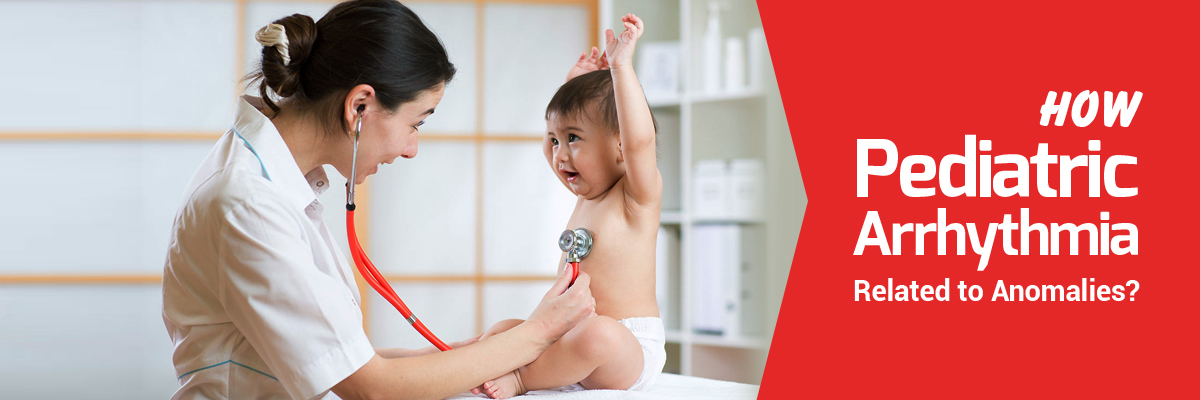

call us:1800 5999 5999
+91 72 0005 0005
How Pediatric Arrhythmia Related to Anomalies?
Posted on January 4, 2019
Arrhythmias, the condition which is also known as abnormal heartbeats are seen to affect children as well as adults and is directly linked to anomalies in the health. The doctor may ask the child questions such as if they are unable to describe the symptoms themselves. The doctor could also ask about the family medical history, the answers of which can help assess the intensity of the anomalies. Now, there are also diagnostic tests which can be conducted to determine the extent of the anomalies due to the arrhythmias.

Long QT Syndrome (LQTS)
Similar to the other arrhythmias, the LQTS is the disorder of the electrical system of the heart.
When the child contracts LQTS, the heart’s lower chambers, also known as the ventricles, take longer than normal to contract and release. The name for this condition comes from the way the letters get associated in the waveform which gets created by the heart’s signals when it gets recorded in a heart ECG monitoring report. LQTS is hereditary and can also be a condition caused sometimes due to a medication’s side effects.
Some arrhythmias caused by LQTS are potentially fatal as they can cause an unexpected cardiac arrest. This makes dealing with the symptoms immediately a huge priority as a parent. The child’s concerns and unease must not be taken lightly. Some symptoms that the child may have the LQTS are fainting (syncope), Irregular heart rate and fluttering in the child’s chest. The treatments for LQTS include procedures called implantable cardioverter defibrillator (ICD), or medications which are beta blockers.
Premature Contractions
Extra contractions, also known as premature contractions are one reason for arrhythmias in children. These early beats which begin in the upper chamber of the heart are known as premature atrial contractions (PACs). The ones beginning in the ventricles are known as Premature Ventricular Contractions (PVCs). An irregular contraction in either chamber makes heart pause between beats with the following beat being more powerful. The child may describe this as the heart skipping a beat.
This condition is normal even in healthy children and there are no found causes of it as well as no special treatment is required. These early beats may disappear on their own and are no cause for concern.
Tachycardia
Tachycardia is the quick beating of the heart. Whether being quick or slow is determined upon factors such as the child’s age and physical status. Sinus tachycardia is considered a normal increase in the individual’s heart rate. This is fairly common in children and no special treatment is required. This usually occurs with excitement, fever or exercise.
Supraventricular Tachycardia (SVT)
Supraventricular tachycardia (SVT) is a condition where your heart suddenly beats much faster than normal. For a child with SVT, the electrical signals in the atria of the heart fire abnormally. This causes the heart rate to increase. The SVT is found to occur in infants as well. Infants having SVT could also breathe quicker than normal and may seem more tired. With proper treatment and diagnosis, SVT is a fairly small cause for concern and the symptoms disappear within months.
For most children, SVT does not pose as a life-threatening condition. The treatment is only looked at if the SVT episodes occur frequently or are prolonged. Symptoms of a child with SVT include dizziness, chest discomfort, weakness, heart palpitations, and an upset stomach. Normally, SVT does not affect the child’s regular life although medications may be required to keep the condition under control. The child’s doctor will also perform routine check-ups.
Ventricular Tachycardia (VT)
VT is a rapid heart rate which begins in the ventricles of the child’s heart. Although uncommon, this condition is very serious. In some cases, VT can be life-threatening and can require immediate medical care.
Apart from occurring in normal children, VT could also result from more serious heart diseases. Certain tests, such as the intracardiac electrophysiologic procedure may be required to assess the condition as well as the medications and required to treat it other treatments could include surgery or radiofrequency ablation.
Sick Sinus Syndrome
When the sinus node does not throw back its electrical signals at a regular rate, it causes the heart rate to slow down. A child with this condition could show signs such as being tired all the time, fainting or being dizzy. In some cases, the child does not even show symptoms. Although unusual in children, this condition affects the children who already gone through cardiac surgery. The options in treating this condition include an artificial pacemaker, medications, or sometimes both of these.
Complete Heart Block
The Heart Block happens when the electrical signals of the heart are unable to normally pass from the upper chambers to the lower chambers of the heart. This causes the blood to be pumped at a slower rate. This condition can be caused by heart muscle injury caused during some surgery, or because of a disease. An artificial pacemaker is required to completely treat the heart block.
In conclusion, regular attention must be paid to the child especially if they complain of anything similar to the symptoms mentioned above. In an event that the child does talk about such symptoms or such symptoms are clearly visible on a frequent basis, the child must be taken to get inspected by a pediatric cardiologist. The specialist will determine what the cause of the problem is and suggest the measures which are to be taken. He may do so using a Cardiac Event Recorder, or by looking at a 24 hr ECG monitoring report which most of the times displays the main cause of the uneasiness.
Tags: Anomalies, cardiac event recorder, Heart Block, heart disease, heart ECG monitoring, Paediatric Arrhythmia, Tachycardia